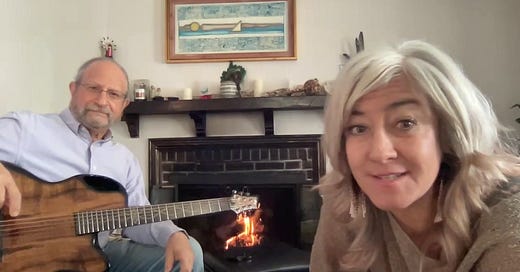The Therapeutic Power of Music: Fireside Reflections with Dr. James Oshinsky
In this second part of our series on Music for People, we’re diving deeper into the therapeutic side of spontaneous music-making. After witnessing the profound impact of the workshops, it’s clear that music isn’t just about creativity—it’s about healing, connection, and transformation.
Click Here to Learn About Workshop
Imagine sitting by the fire with Dr. James Oshinsky, guitar in hand, reflecting on the intersection of psychiatry, therapy, and the human spirit. That’s exactly where we find ourselves, discussing how music can be a lifeline for those seeking emotional and psychological support.
Why Music Matters in Mental Health
Music has a unique ability to bypass the intellect and go straight to the heart. It moves energy, releases tension, and helps people process emotions that are often buried deep within. Dr. Oshinsky and his colleagues at Music for People understand that improvisational music-making creates a safe space for expression without judgment.
Research has shown that music can:
Regulate the nervous system and help shift from stress to relaxation
Enhance mood stability through rhythm and repetition
Foster a sense of connection in a group setting, reducing feelings of isolation
Promote neuroplasticity, allowing the brain to form new pathways related to emotional resilience
Music as a Therapeutic Tool
One of the most powerful aspects of these workshops is how they help people reconnect with parts of themselves that have been suppressed or neglected. Dr. Oshinsky shares stories from decades of experience—whether with clients overcoming anxiety, finding their voice after trauma, or simply remembering the joy of spontaneous play.
Because of his experience with both modalities, sound and talk, we touch on the importance of music for expressing what defies capture in words.
Sitting by the fire, Dr. Oshinsky reflects on how music therapy intersects with modern psychiatry. In a field often dominated by medication and talk therapy, music provides a non-verbal pathway to healing. It’s not about performing perfectly; it’s about feeling, expressing, and connecting.
Creating a Safe Space for Expression
During our conversation, we discuss the importance of creating environments where people feel safe enough to explore their sound. Dr. Oshinsky emphasizes that music-making doesn’t have to be intimidating. It’s about showing up, being present, and letting go of expectations.
This is why the workshops are not just for musicians but for anyone looking to expand their emotional awareness and connect with others. Whether you’re a therapist, a musician, or someone looking to understand your inner world better, these sessions provide tools that go beyond the workshop walls.
Why You Should Join Us
If you’re curious about how music can be more than just entertainment—how it can be a therapeutic journey—this conversation is for you. Dr. Oshinsky also shares practical tips on using music in your own life to reduce stress and enhance well-being.
Whether you’re a mental health professional or simply passionate about holistic healing, this session offers valuable insights into the healing potential of spontaneous music-making.














Share this post